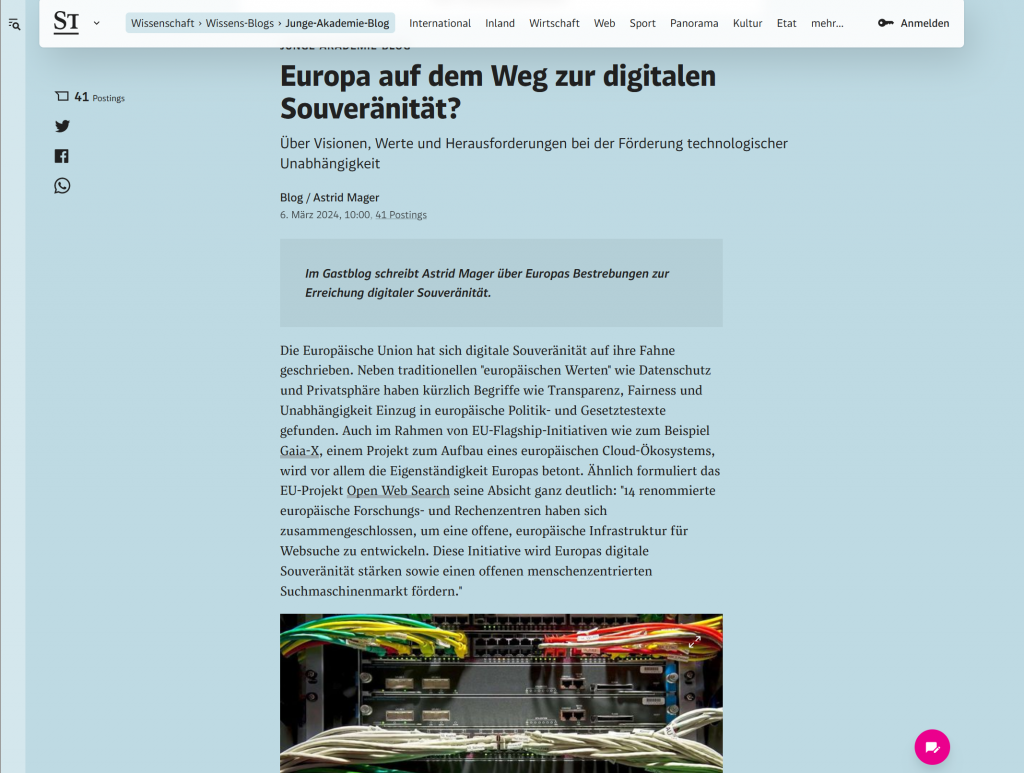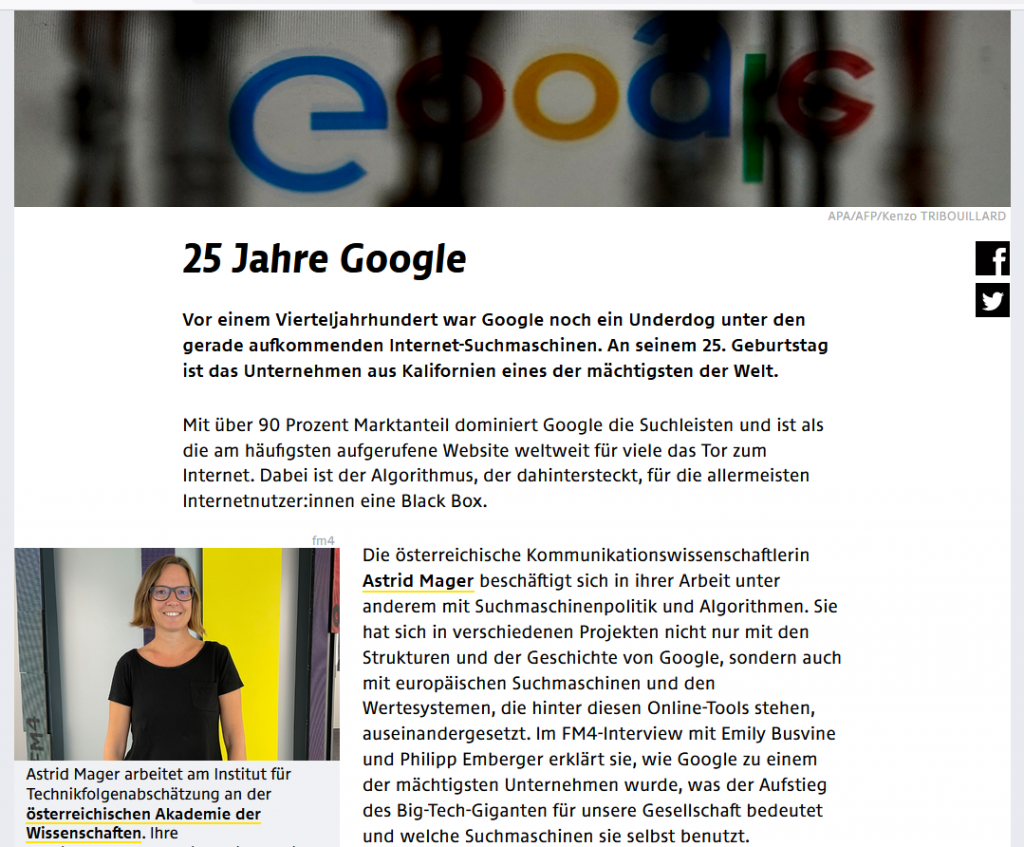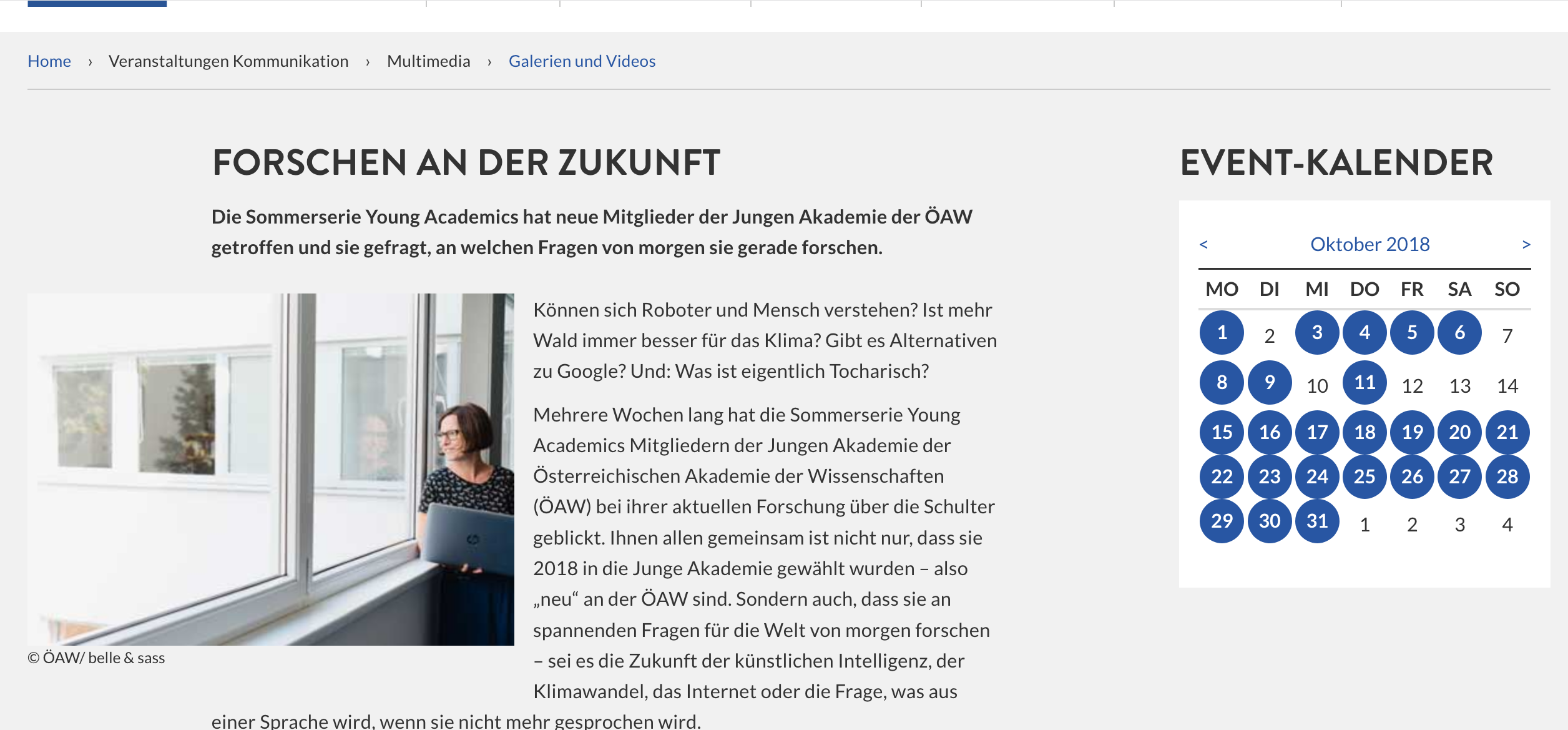Please have a look at the blog post I wrote for the Austrian daily newspaper DerStandard. It’s part of the blog post series of the Young Academy of the Austrian Academy of Sciences. And it deals with the Eurpean way towards digital sovereignty with a question mark at the end 😉 – in German.
Category Archives: press
You’re at home baby
Letzte Woche war ich zur Abwechslung mal bei Jugendradio! Fein wars!! Mit Dank an Veronika Weidinger für die Einladung! Interview und Podcast zum Nachhören gibts hier:
ams-algorithmus_fiktives fallbeispiel “Shifteh A.”
Doris Allhutter und ich haben einen Beitrag für den Blog “Arbeit und Wirtschaft” zu unserer Studie zum sogenannten “AMS-Algorithmus” verfasst (auf dt.). Der Blog Post ist hier online abrufbar; die Studie (gemeinsam mit Florian Cech, Fabian Fischer und Gabriel Grill) ist hier zu finden. Aus Platzgründen konnte das im Blog Post verwendete “Szenario” einer fiktiven Arbeitssuchenden – Shifteh A. – leider nicht zur Gänze abgebildet werden. Deshalb möchte ich es hier veröffentlichen:
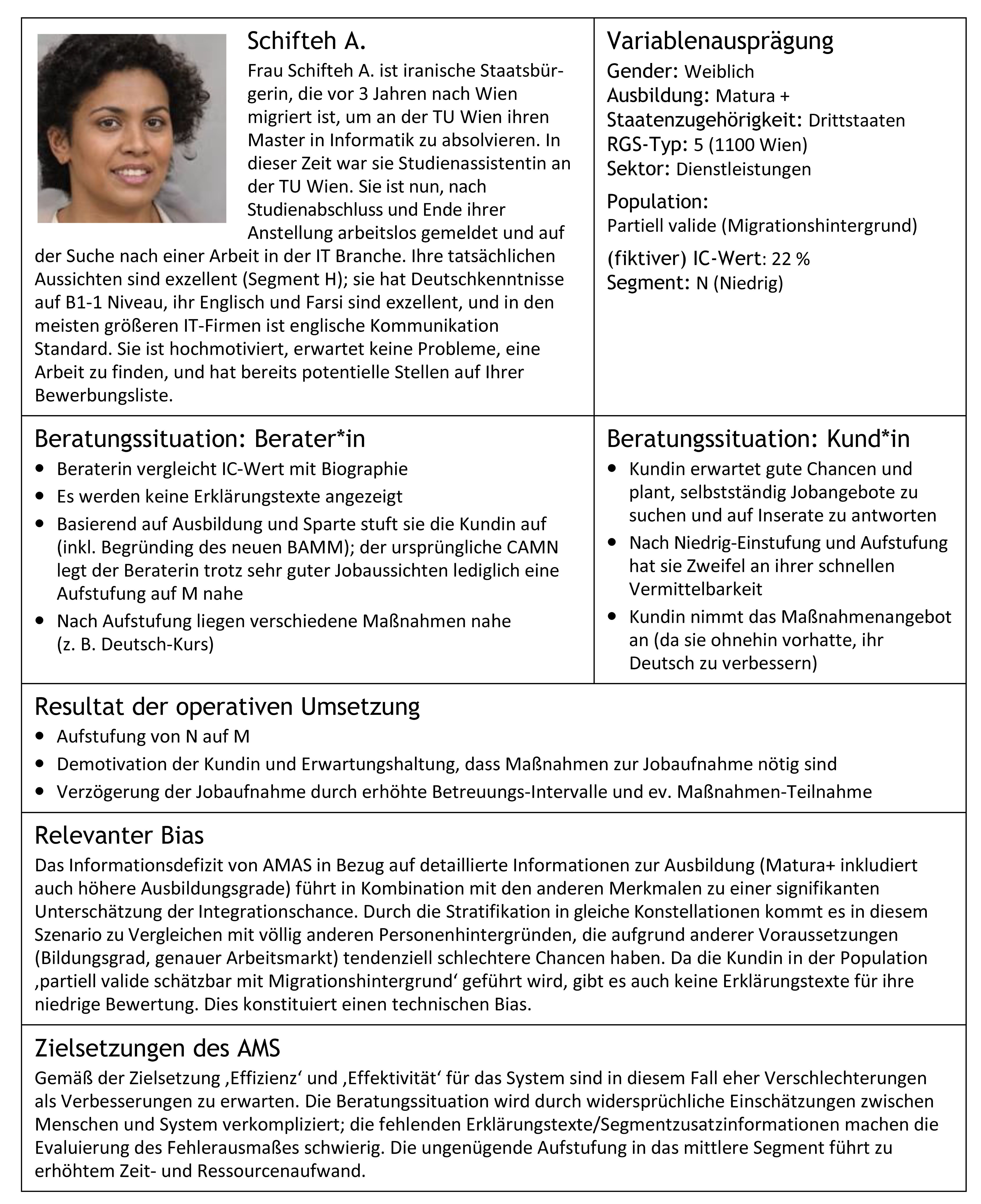 Nachdem wir im Rahmen unserer Studie weder einen direkten Zugang zu AMAS (Arbeitsmarkt-Chancen-Assistenzsystem), noch zu den dafür verwendeten Daten hatten sind die Berechnungen des Szenarios fiktiv. Sie können keine tatsächlichen IC-Werte (Integrationschancen-Werte) oder Fehlerraten berechnen, aber sie können die mit AMAS verbundenen Probleme im Zusammenspiel von technischem Bias und sozialer Praxis (auf Basis der uns vom AMS zur Verfügung gestellten Dokumente & Materialien) plausibel illustrieren. In unserem Bericht haben wir drei weitere Szenarien verfasst, die alle auf ein konkretes Problem in der praktischen Handhabung von AMAS eingehen. Sie können hier im Detail nachgelesen werden.
Nachdem wir im Rahmen unserer Studie weder einen direkten Zugang zu AMAS (Arbeitsmarkt-Chancen-Assistenzsystem), noch zu den dafür verwendeten Daten hatten sind die Berechnungen des Szenarios fiktiv. Sie können keine tatsächlichen IC-Werte (Integrationschancen-Werte) oder Fehlerraten berechnen, aber sie können die mit AMAS verbundenen Probleme im Zusammenspiel von technischem Bias und sozialer Praxis (auf Basis der uns vom AMS zur Verfügung gestellten Dokumente & Materialien) plausibel illustrieren. In unserem Bericht haben wir drei weitere Szenarien verfasst, die alle auf ein konkretes Problem in der praktischen Handhabung von AMAS eingehen. Sie können hier im Detail nachgelesen werden.
Digitale Weichenstellungen in der Krise
Here’s the link to my Standard blog post on COVID-19 & digitalization (in German); the teaser reads as follows:
E-Learning-Plattformen und Videokonferenz-Tools haben sich in unserem Alltag eingenistet. Kaum ein Haushalt, der sich dem noch entziehen kann. Dennoch dürfen grundlegende technopolitische Fragen nicht aus den Augen verloren werden.
media coverage
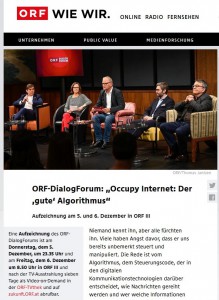 Last year, my work has been covered by various media outlets and events. First, the Austrian Academy of Sciences (ÖAW) made a portrait/ interview with me on the way visions and values shape search engines as part of their series “Forschen für Europa”. This piece included a fancy foto shooting, as you can see here. Second, I was invited to take part in the panel discussion of the ORF Public Value event “Occupy Internet. Der gute Algorithmus” (together with Tom Lohninger from epicenter.works, Matthias Kettemann from the Hans-Bredow-Institut and Franz Manola from the ORF Plattformmanagement). The live discussion took place at the “Radiokulturhaus” and was aired in ORF 3 thereafter. Here you can find the abstract, the press release and the video in case you want to watch the whole discussion. Finally, I was invited as a studio guest to the radio broadcast “Punkt 1” at Ö1 “Das eingefärbte Fenster zur Welt“, where I spoke about alternative search engines and people could phone in and ask questions per email. Talk radio it is! 😉 – all in German.
Last year, my work has been covered by various media outlets and events. First, the Austrian Academy of Sciences (ÖAW) made a portrait/ interview with me on the way visions and values shape search engines as part of their series “Forschen für Europa”. This piece included a fancy foto shooting, as you can see here. Second, I was invited to take part in the panel discussion of the ORF Public Value event “Occupy Internet. Der gute Algorithmus” (together with Tom Lohninger from epicenter.works, Matthias Kettemann from the Hans-Bredow-Institut and Franz Manola from the ORF Plattformmanagement). The live discussion took place at the “Radiokulturhaus” and was aired in ORF 3 thereafter. Here you can find the abstract, the press release and the video in case you want to watch the whole discussion. Finally, I was invited as a studio guest to the radio broadcast “Punkt 1” at Ö1 “Das eingefärbte Fenster zur Welt“, where I spoke about alternative search engines and people could phone in and ask questions per email. Talk radio it is! 😉 – all in German.
Suchmaschinen in Europa – europäische Suchmaschinen?
I was invited to write a blog post about my research for the Young Academy blog at the daily newspaper “Der Standard“. Here’s the teaser:
Suchmaschinen in Europa – europäische Suchmaschinen?
Suchmaschinen sind gesellschaftspolitischen Entwicklungen unterworfen. Doch welche Rolle spielt Europa dabei?
Enjoy reading the the full text here (in German)!
If you want to learn more about all the great members of the Young Academy, check out the summer series portraits of new YA members. Mine is titled “Kleine Davids gegen Google Goliath“. It’s a fine compilation of interdisciplinary research my young colleagues are doing.
europe vs facebook/ Ö1: 10.02.; 22:30pm
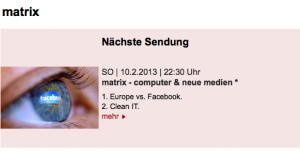 Here’s the link to the upcoming radio broadcast dealing with the student initiative “europe vs facebook”. Since I gave an interview for the program, along with other “experts”, the broadcast will most likely contain one or two of my sentences
Here’s the link to the upcoming radio broadcast dealing with the student initiative “europe vs facebook”. Since I gave an interview for the program, along with other “experts”, the broadcast will most likely contain one or two of my sentences  It will go on air on Sunday, 10.02., at 22:30 pm; radio station Ö1. Or, alternatively, you could also follow the program online. I’m not sure if there’ll be a podcast available right after, but if so I’ll post the link. You’ll find more information on the program here.
It will go on air on Sunday, 10.02., at 22:30 pm; radio station Ö1. Or, alternatively, you could also follow the program online. I’m not sure if there’ll be a podcast available right after, but if so I’ll post the link. You’ll find more information on the program here.
Algorithmic ideology on science.orf.at
The interview I gave last week for science.ORF; a website of the Austrian TV broadcast, is online now. Thanks to Lukas Wieselberg!! Here’s the abstract (in German):
Die Ideologie des Algorithmus
 Die Sozialwissenschaftlerin Astrid Mager hat untersucht, wie Google, Bing und andere Suchmaschinen entstehen. Im Mittelpunkt standen dabei nicht die Technologien, sondern die Werte, die hinter der Entwicklung stecken. Die “Ideologie des Suchalgorithmus” ist Ausdruck des gegenwärtigen Kapitalismus, sagt Mager.
Die Sozialwissenschaftlerin Astrid Mager hat untersucht, wie Google, Bing und andere Suchmaschinen entstehen. Im Mittelpunkt standen dabei nicht die Technologien, sondern die Werte, die hinter der Entwicklung stecken. Die “Ideologie des Suchalgorithmus” ist Ausdruck des gegenwärtigen Kapitalismus, sagt Mager.
© photo credit: EPA/ science.orf
=> read the full story on science.orf.at.

